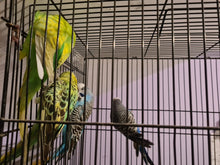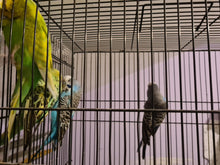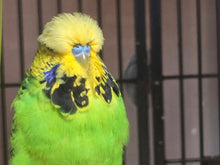Care & Feeding
Personality & Behavior
Speech & Sound
Health & Common Conditions
Get a Budgie (Parakeet)
- The budgie’s Latin name means “song bird with wavy lines
- The budgie is the most popular pet bird in the world, although, in the United States, it is second in popularity behind the cockatiel
- Budgies can amass large vocabularies. A budgie’s voice sounds like a sped up recording, so an owner might not even recognize that their budgie is talking!
- Diet & Nutrition: Parrot Food
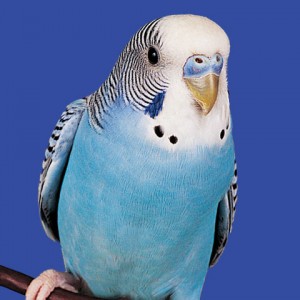 The budgie, or budgerigar, is most commonly referred to as the more generic term “parakeet” in the United States. The wild budgie is similar to the birds we see today in pet shops, though smaller (between 6 and 7 inches long), and only found in the nominate color, green. Its Latin name means, roughly, “song bird with wavy lines,” which is a pretty good description of this popular bird.
The budgie, or budgerigar, is most commonly referred to as the more generic term “parakeet” in the United States. The wild budgie is similar to the birds we see today in pet shops, though smaller (between 6 and 7 inches long), and only found in the nominate color, green. Its Latin name means, roughly, “song bird with wavy lines,” which is a pretty good description of this popular bird.
Naturalist John Gould and his brother-in-law, Charles Coxen, brought Budgies to Europe around 1838. Europeans became charmed with the birds, which bred readily, making them a staple pet in wealthy homes. The Budgie was displayed at the Antwerp Zoo in Belgium around 1850, and began to gain in popularity, not only with the wealthy. Australia banned exportation of Budgies in 1894, and the Europeans had to breed their existing stock in order to continue the hobby. The budgie found its way to America in the late 1920s, but didn’t experience real popularity until the 1950s. Today, it’s the most popularbird in the world.
Native Region / Natural Habitat
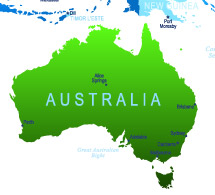
The budgie is native to Australia, where it still dominates the grasslands in large, undulating flocks. The wild budgie is similar to the birds we see today in pet shops, though smaller, and only found in the nominate color, green.
The nomadic wild parakeet is found in large flocks that are always on the search for water, which is limited in the scrublands, the habitat that makes up much of the budgie’s natural range. They breed in the rainy season when water and food are plentiful, and nest in hollowed out trees or tree limbs. They can be pesky to farmers, and are especially dangerous to grain crops.
Care & Feeding
Budgies can live between 7 to 15 years, though the average is far less than seven due to mistreatment, accidents, or lack of knowledge about appropriate bird care. It seems that this little bird is often seen as a “throw away” pet because it’s inexpensive. Budgies are also prone to obesity, fatty tumors and liver, foot disorders, scaly face, and intestinal parasites, all of which require veterinary care.
Most budgies are ground-feeders that eat primarily seeds and plant material. Lafeber foods are a simple and healthy way to feed your parakeet properly. Our research has shown that little birds get “hooked” on seeds easily. Many of our foods incorporate seeds with healthy pellets, fruits and vegetables, as well as Omega 3 and 6 fatty acids and chelated minerals.




